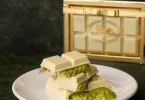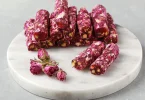Turkey’s rich culinary tradition offers a delightful array of sweets that captivate the taste buds and stir the imagination. Among these, chestnut sugar, Turkish delight, and other traditional confections stand out as iconic symbols of Turkish culture, blending centuries-old craftsmanship with modern tastes.
Traditional Sweets Chestnut Sugar
Chestnut sugar, or “Kestane Şekeri,” is one of Turkey’s beloved sweets, particularly popular in the city of Bursa. This treat involves chestnuts carefully candied in sugar syrup, creating a delicate balance of sweetness and nutty flavor. What makes chestnut sugar truly special is its texture—soft on the inside with a slightly caramelized exterior, offering a melt-in-your-mouth experience. It is often enjoyed as a snack or served alongside Turkish tea, making it an integral part of Turkish hospitality.
Turkish Delight: The Jewel of Confectionery
Turkish delight, or “Lokum,” is perhaps one of Turkey’s most famous sweets, known and loved across the globe. Available in a wide variety of flavors, including rose, lemon, and pomegranate, Turkish delight is a gelatinous, chewy treat that often includes nuts like pistachios or hazelnuts. The combination of floral scents and natural sweetness creates a luxurious confection that is both soft and satisfying. Traditionally, Turkish delight is served with coffee or tea and is often gifted during holidays and special occasions as a symbol of goodwill and celebration.
Traditional Sweets: A Cultural Heritage
Beyond chestnut sugar and Turkish delight, Turkey boasts a rich repertoire of traditional sweets that reflect the country’s diverse history and cultural influences. From baklava, with its flaky layers of pastry and rich nut filling, to halva, a sweetened sesame-based treat, Turkish desserts are marked by their use of high-quality ingredients and painstaking preparation techniques. Sherbet-based desserts like tulumba and baklava offer a crispy texture bathed in fragrant syrups, while milky treats like muhallebi or sütlaç provide a creamy, delicate contrast.
These sweets often carry symbolic meanings and are closely tied to Turkish festivals, religious celebrations, and family gatherings. They represent more than just indulgence; they are an expression of love, hospitality, and tradition that has been passed down through generations.
A Traditional Sweets
The charm of Turkish sweets lies in their ability to evoke the warmth of Turkish culture, whether through a simple cup of tea paired with chestnut sugar or a festive gathering where trays of baklava and Turkish delight are shared among loved ones. With each bite, you’re not only enjoying a delicious treat but also partaking in a centuries-old tradition of craftsmanship, hospitality, and love for the sweet things in life.








